slowly reading and annotating textssideblog / personal catalogue / runs on a queue
Don't wanna be here? Send us removal request.
Text
Dr Lisa Sugiura, senior lecturer in criminology and cybercrime at the University of Portsmouth, explains: It’s worth looking at the history and origins of [the manosphere]. If you go right back to the early Usenet groups in the 1990s and you think about the demographics of the sort of people [who] would have used these, they are primarily white, educated, tech-savvy men. And there was this thinking about it being their space, their ownership of the space, which is something else worth thinking of when we think of the manosphere and their vitriol – they are ‘claiming what is rightfully theirs’ – and that demographic hasn’t really changed. [It resembles] what we saw years ago in terms of race and gender – it really is white, western men – and in terms of the education: it is very much the developed countries, very much the US, Canada, Australia and the UK. And what I’ve been getting through the data I’m looking at is it links back to the alt-right; it’s about white supremacy, and there’s very disparaging rhetoric coming out towards black and Asian men as well, which is where you get the suggestion that this is a predominantly white space.”
— Laura Bates (2020) Men Who Hate Women
0 notes
Text
Tim Squirrell, a researcher studying social interaction in online communities, says: The first thing you notice when you look at an incel forum is a mix of hopelessness and anger. These people genuinely hate and pity themselves, but, simultaneously (and almost paradoxically), they feel this righteous anger and vindication that they see the world for how it really is, even if they’re at the bottom of the heap. That feeling of absolute certainty that they are correct is twinned with the fact that they’re correct about their own misery, and that’s a powerful and strange cocktail.
— Laura Bates (2020) Men Who Hate Women
1 note
·
View note
Text
At the root of manosphere communities and white supremacy is a shared belief that the core, sacred purpose of man is to have sex, to procreate and to dominate. Thus, power and control are utterly central to both ideologies. The concept of a white man as a heterosexual, stereotypically masculine, utterly omnipotent figure is key, ironically representing both the hopelessly suffocating societal standard that drives many men to join these communities in the first place and the supposed solution they are indoctrinated to pursue with ever more extreme measures.
— Laura Bates (2020) Men Who Hate Women
1 note
·
View note
Text
In the case of incels, their prime focus is a feverish obsession with sex, and anger at being ‘denied’ it. Yes, this is a community of tens of thousands of men who claim that the world (and, in particular, individual women) is withholding from them the vital human right of getting laid. Amazingly, in the thousands of conversations and endless hours spent discussing their sparse sex lives, alongside lengthy rants about how women are evil, subhuman vessels, it never seems to occur to these men that their hatred of women might be related to their lack of romantic success. In fact, even to suggest such a thing is a banning offence in many incel forums. Instead, incels see themselves as innocent and tragic victims, creating a vivid portrait of a bleak society irreversibly stacked against them.
— Laura Bates (2020) Men Who Hate Women
72 notes
·
View notes
Text
Incels use the metaphor of the red pill to describe the moment a man’s blinkers fall away and he suddenly realises that he has been lied to his whole life. The world that he has been forced to believe works in his favour is actually hopelessly stacked against him. Everything, from our government to our wider society, is designed to promote women over men. The myth of male privilege, so the story goes, is perpetuated by a massive feminist conspiracy. Incels refer to this man-hating world as a ‘gynocracy’, a clever system designed to keep men (the true victims of oppression) in their subordinate place, without them even noticing.
Lost your job? What could be more appealing than a whole new worldview in which it isn’t your fault: you’ve just been the victim of a power grab by women and minorities. Dumped or divorced? That lying bitch is part of a much bigger attack on you and other men like you. Angry that you don’t seem to be lucky in love? It’s not you, it’s her. Every single ‘her’, in fact.
The manosphere […] subverts the narrative of the privileged and the victim altogether. It tells men that they are suffering, and it blames women.
— Laura Bates (2020) Men Who Hate Women
9 notes
·
View notes
Text
We don’t like to risk offending men. We find it hard to think of straight, white men as a homogenous group, though it comes so easily when we think of other types of people, because we are used to affording such men the privilege of discrete identities. These men are complex, heroic, individual. Their decisions and choices are seen to spring from a set of distinct and unique circumstances, because we see them as distinct and unique people. We don’t mind talking about women as a group, and about violence against women as a phenomenon, but we do so as though it is something that just happens.
— Laura Bates (2020) Men Who Hate Women
8 notes
·
View notes
Text
hey gyns! i’m so sorry i haven’t posted in so long. i thought we could have a poll to choose which book to read next.
CORRECTION: the phyllis chesler book title is actually “woman’s inhumanity to woman”!!! sorry :/ it seems like i’ve forgotten how to copy? i promise i won’t make the same mistake with the quotes though.
2nd CORRECTION: her name is supposed to be laura bates not hates!!! how mortifying. not going to repost/reupload the poll since it’s already gotten a couple of votes, but please know that i am so so sorry!!! and embarrassed!!! i feel very illiterate D:
#polls#if you have a suggestion for a book feel free to send me a message#i’ll include it in a future poll after i’ve finished reading the book chosen from this poll
8 notes
·
View notes
Text
The stronger women were becoming politically, the heavier the ideals of beauty would bear down upon them, mostly in order to distract their energy and undermine their progress.
— Naomi Wolf (1990) The Beauty Myth
61 notes
·
View notes
Text
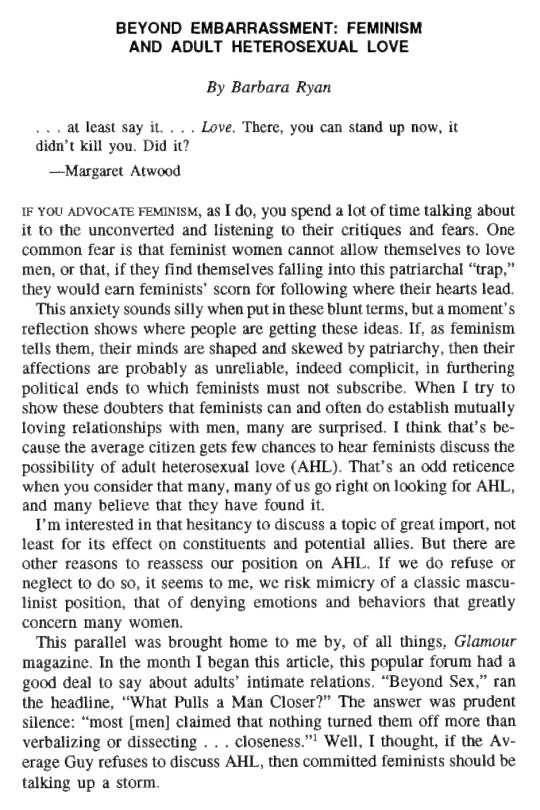
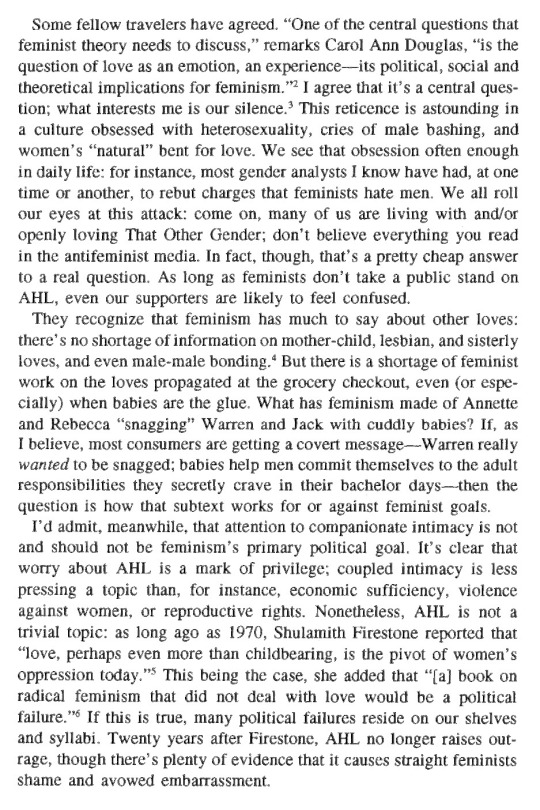
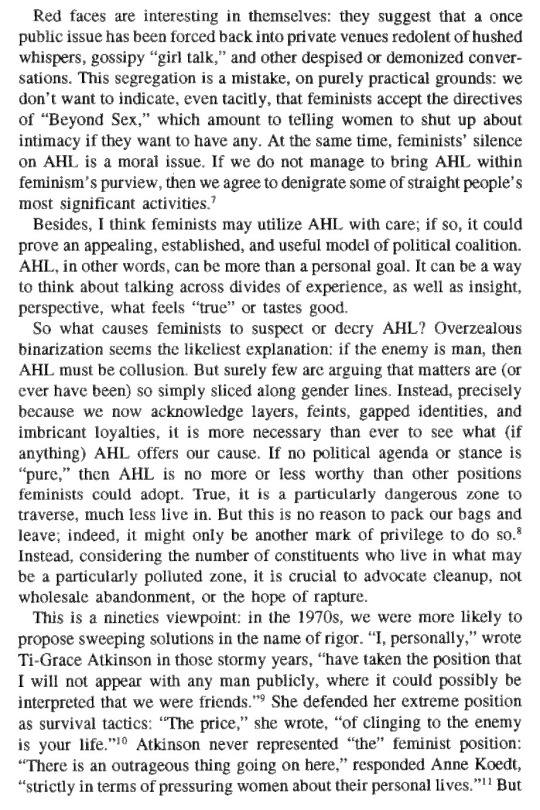
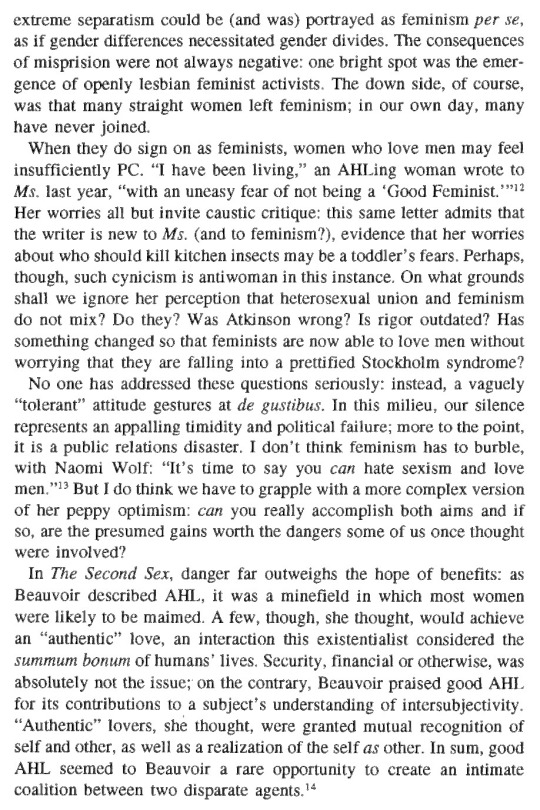
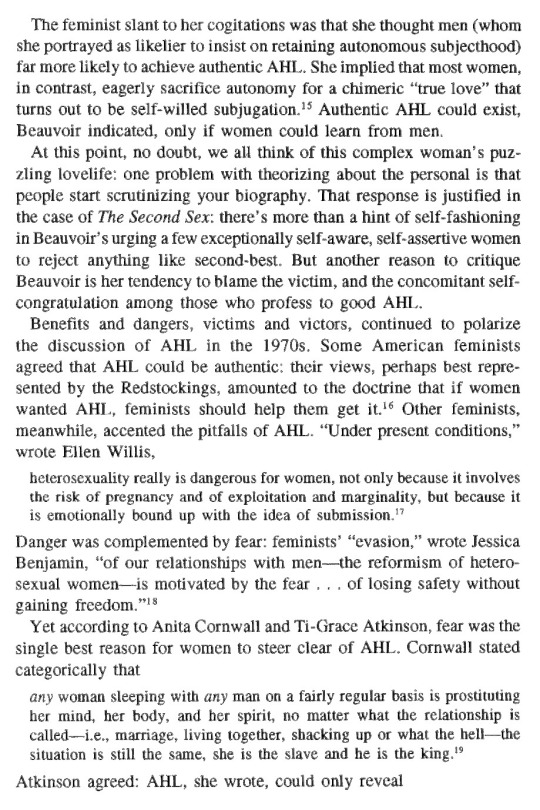

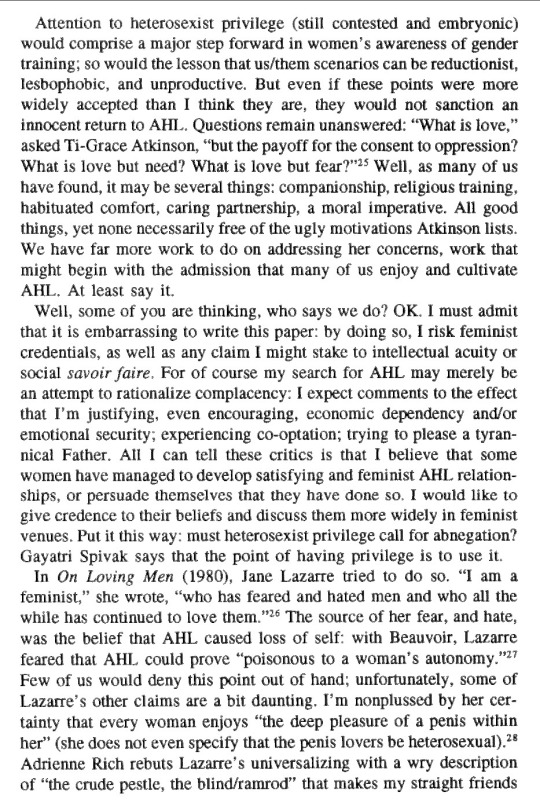
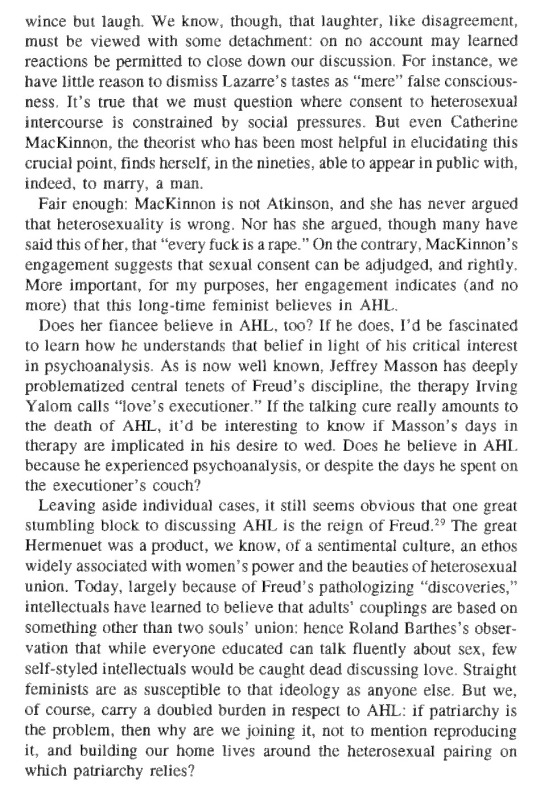
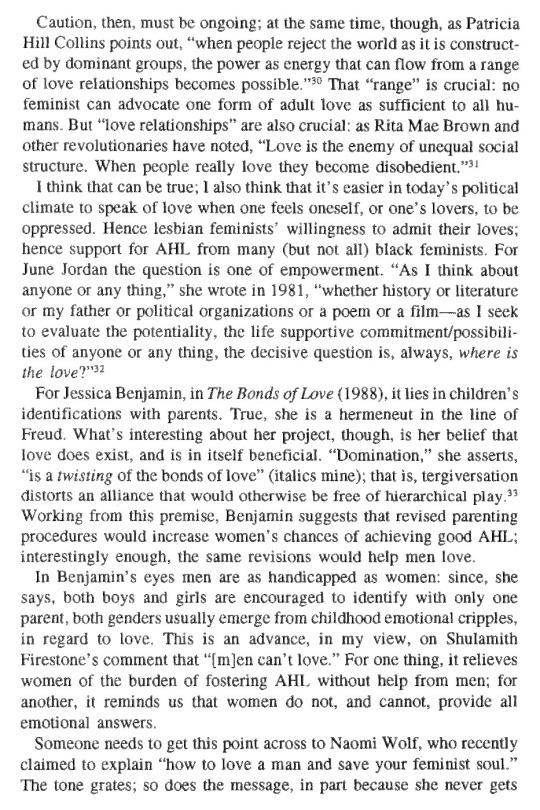
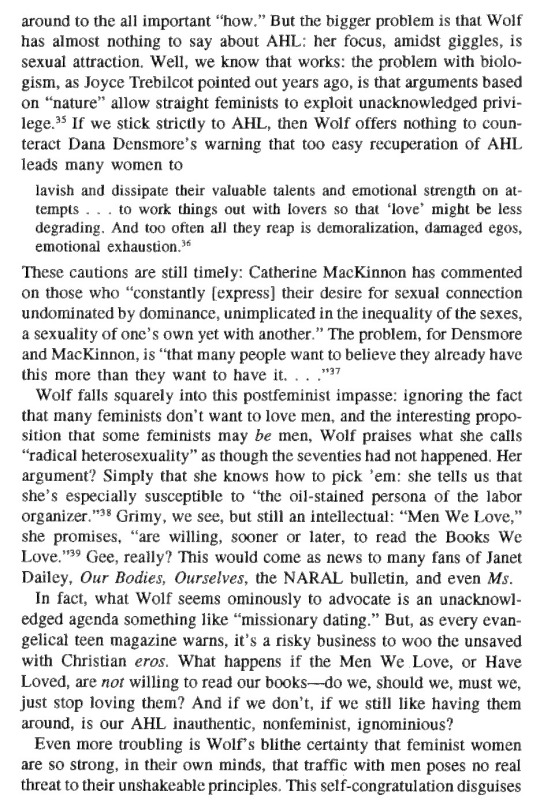
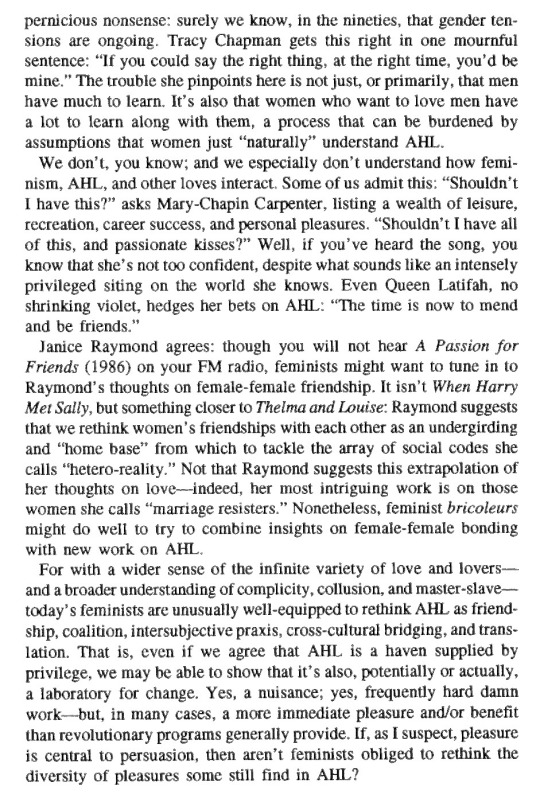

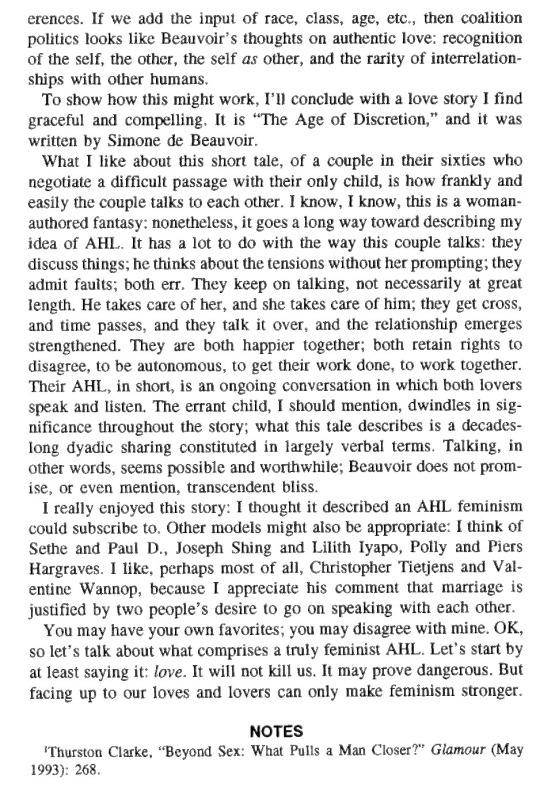
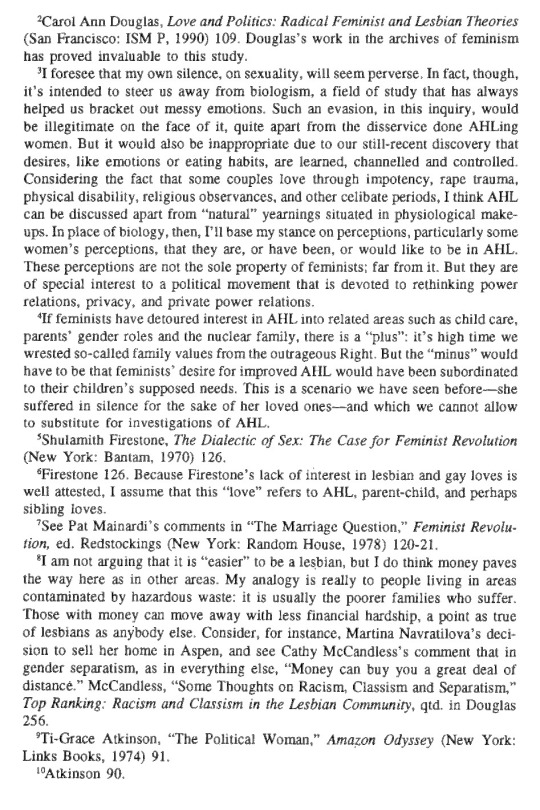
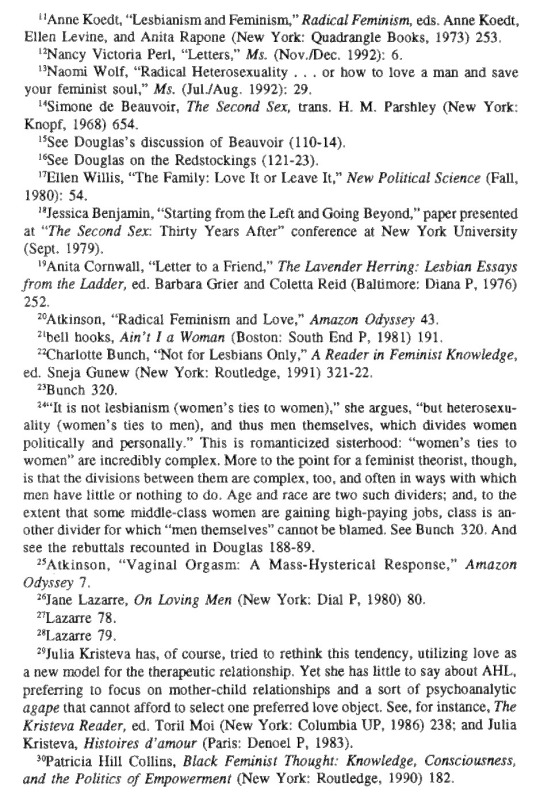
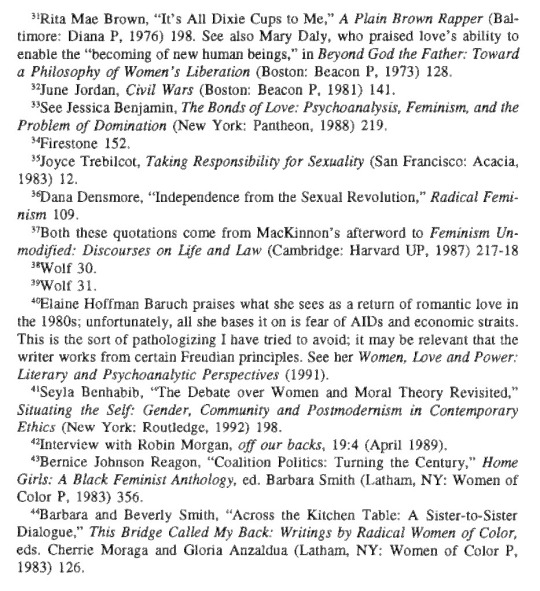
Ryan, Barbara. “BEYOND EMBARRASSMENT: FEMINISM AND ADULT HETEROSEXUAL LOVE.” The Centennial Review, vol. 37, no. 3, 1993, pp. 471–86.
JSTOR, http://www.jstor.org/stable/23739489.
#heterosexual relationships#love#romance#barbara ryan#beyond embarrassment: feminism and adult heterosexual love#long post#i don't 100% agree with the author but i think this is still worth a read... she makes a few good points#the part about how women can and should help their male partners become better feminists... that is definitely eye roll inducing#BUT it is important to leave the echo chamber and engage with texts that aren't 100% supportive of your worldview. expand your perspective!#personally i am much more in agreement with separatists but i don't think hostility (on either side) is the right approach#sorry to be cynical but i don't think we're ever going to be able to convince women to give romancing men up#i don't know what the right approach is though#it's so nuanced... even 30 years after this was written we're still having this exact same debate here on tumblr...
23 notes
·
View notes
Text
But we can imagine, to save ourselves, a life in the body that is not value-laden; a masquerade, a voluntary theatricality that emerges from abundant self-love. A pro-woman redefinition of beauty reflects our redefinitions of what power is. Who says we need a hierarchy? Where I see beauty may not be where you do. Some people look more desirable to me than they do to you. So what? My perception has no authority over yours. Why should beauty be exclusive? Admiration can include so much. Why is rareness impressive? The high value of rareness is a masculine concept, having more to do with capitalism than with lust. What is the fun in wanting the most what cannot be found? Children, in contrast, are common as dirt, but they are highly valued and regarded as beautiful.
How might women act beyond the myth? Who can say? Maybe we will let our bodies wax and wane, enjoying the variations on a theme, and avoid pain because when something hurts us it begins to look ugly to us. Maybe we will adorn ourselves with real delight, with the sense that we are gilding the lily. Maybe the less pain women inflict on our bodies, the more beautiful our bodies will look to us. Perhaps we will forget to elicit admiration from strangers, and find we don’t miss it; perhaps we will await our older faces with anticipation, and be unable to see our bodies as a mass of imperfections, since there is nothing on us that is not precious. Maybe we won’t want to be the “after” anymore.
How to begin? Let’s be shameless. Be greedy. Pursue pleasure. Avoid pain. Wear and touch and eat and drink what we feel like. Tolerate other women’s choices. Seek out the sex we want and fight fiercely against the sex we do not want. Choose our own causes. And once we break through and change the rules so our sense of our own beauty cannot be shaken, sing that beauty and dress it up and flaunt it and revel in it: In a sensual politics, female is beautiful.
A generation ago, Germaine Greer wondered about women: “What will you do?” What women did brought about a quarter century of cataclysmic social revolution. The next phase of our movement forward as individual women, as women together, and as tenants of our bodies and this planet, depends now on what we decide to see when we look in the mirror.
What will we see?
— Naomi Wolf (1990) The Beauty Myth
9 notes
·
View notes
Text
We do not need to change our bodies, we need to change the rules. Beyond the myth, women will still be blamed for our appearances by whomever needs to blame us. So let’s stop blaming ourselves and stop running and stop apologizing, and let’s start to please ourselves once and for all. The “beautiful” woman does not win under the myth; neither does anyone else. The woman who is subjected to the continual adulation of strangers does not win, nor does the woman who denies herself attention. The woman who wears a uniform does not win, nor does the woman with a designer outfit for every day of the year. You do not win by struggling to the top of a caste system, you win by refusing to be trapped within one at all. The woman [who wins] calls herself beautiful and challenges the world to change to truly see her.
— Naomi Wolf (1990) The Beauty Myth
15 notes
·
View notes
Text
Rivalry, resentment, and hostility provoked by the beauty myth run deep. Sisters commonly remember the grief of one being designated “the pretty one.” Mothers often have difficulty with their daughters’ blooming. Jealousy among the best of friends is a cruel fact of female love. Even women who are lovers describe beauty competition. It is painful for women to talk about beauty because under the myth, one woman’s body is used to hurt another. Our faces and bodies become instruments for punishing other women, often used out of our control and against our will. At present, “beauty” is an economy in which women find the “value” of their faces and bodies impinging, in spite of themselves, on that of other women’s. This constant comparison, in which one woman’s worth fluctuates through the presence of another, divides and conquers.
To get past this divisiveness, women will have to break a lot of taboos against talking about it, including the one that prohibits women from narrating the dark side of being treated as a beautiful object. From the dozens of women to whom I have listened, it is clear that the amount of pain a given woman experiences through the beauty myth bears no relationship at all to what she looks like relative to a cultural ideal.
While the “beautiful” woman is briefly at the apex of the system, this is, of course, far from the divine state of grace that the myth propagates. The pleasure to be had from turning oneself into a living art object, the roaring in the ears and the fine jetspray of regard on the surface of the skin, is some kind of power, when power is in short supply. But it is not much compared to the pleasure of getting back forever inside the body; the pleasure of discovering sexual pride, a delight in a common female sexuality that overwhelms the divisions of “beauty”; the pleasure of shedding self-consciousness and narcissism and guilt like a chainmail gown; the pleasure of the freedom to forget all about it.
Only then will women be able to talk about what “beauty” really involves: the attention of people we do not know, rewards for things we did not earn, sex from men who reach for us as for a brass ring on a carousel, hostility and scepticism from other women, adolescence extended longer than it ought to be, cruel aging, and a long hard struggle for identity. And we will learn that what is good about “beauty”—the promise of confidence, sexuality, and the self-regard of a healthy individuality—are actually qualities that have nothing to do with “beauty” specifically, but are deserved by and, as the myth is dismantled, available to all women. The best that “beauty” offers belongs to us all by right of femaleness. When we separate “beauty” from sexuality, when we celebrate the individuality of our features and characteristics, women will have access to a pleasure in our bodies that unites us rather than divides us. The beauty myth will be history.
— Naomi Wolf (1990) The Beauty Myth
#rivalry#competition#beauty culture#naomi wolf#the beauty myth#radblr#radfem#radical feminism#radfem safe#radical feminist safe
103 notes
·
View notes
Text
The terrible truth is that though the marketplace promotes the [beauty] myth, it would be powerless if women didn’t enforce it against one another. For any one woman to outgrow the myth, she needs the support of many women. The toughest but most necessary change will come not from men or from the media, but from women, in the way we see and behave toward other women.
— Naomi Wolf (1990) The Beauty Myth
31 notes
·
View notes
Text
The ideology of “beauty” was a shortcut promise to agitating women—a historical placebo—that we could be confident, valued, heard out, respected, and make demands without fear.
— Naomi Wolf (1990) The Beauty Myth
3 notes
·
View notes
Text
Young women express feelings of being scared and isolated “insiders” as opposed to angry and united outsiders, and this distinction makes backlash sense: The best way to stop a revolution is to give people something to lose. [The anti beauty myth/feminist movement] would need to politicize eating disorders, young women’s uniquely intense relationship to images, and the effect of those images on their sexuality—it would need to make the point that you don’t have much of a right over your own body if you can’t eat. It would need to analyze the antifeminist propaganda young women have inherited, and give them tools, including arguments like this one, with which to see through it. While transmitting the previous heritage of feminism intact, it would need to be, as all feminist waves are, peer-driven: No matter how wise a mother’s advice is, we listen to our peers. It would have to make joy, rowdiness, and wanton celebration as much a part of its project as hard work and bitter struggle, and it can begin all this by rejecting the pernicious fib that is crippling young women—the fib called postfeminism, the pious hope that the battles have all been won. This scary word is making young women, who face many of the same old problems, once again blame themselves—since it’s all been fixed, right? It strips them of the weapon of theory and makes them feel alone once again. We never speak complacently of the post-Democratic era: Democracy, we know, is a living, vulnerable thing that every generation must renew. The same goes for that aspect of democracy represented by feminism.
— Naomi Wolf (1990) The Beauty Myth
14 notes
·
View notes
Text
When faced with the [beauty] myth, the questions to ask are not about women’s faces and bodies but about the power relations of the situation. Who is this serving? Who says? Who profits? What is the context? When someone discusses a woman’s appearance to her face, she can ask herself. Is it that person’s business? Are the power relations equal? Would she feel comfortable making the same personal comments in return?
— Naomi Wolf (1990) The Beauty Myth
#naomi wolf#the beauty myth#radblr#radfem#radical feminism#radfem safe#radical feminist safe#anti beauty industry#anti beauty culture
16 notes
·
View notes
Text
It is often said that we must make fashion and advertising images include us, but this is a dangerously optimistic misunderstanding of how the market works. Advertising aimed at women works by lowering our self-esteem. If it flatters our self-esteem, it is not effective. Let’s abandon this hope of looking to the index fully to include us. It won’t, because if it does, it has lost its function. As long as the definition of “beauty” comes from outside women, we will continue to be manipulated by it.
We claimed the freedom to age and remain sexual, but that rigidified into the condition of aging “youthfully.” We began to wear comfortable clothing, but the discomfort settled back onto our bodies. The seventies’ “natural” beauty became its own icon; the 1980s’ “healthy” beauty brought about an epidemic of new diseases and “strength as beauty” enslaved women to our muscles. This process will continue with every effort women make to reform the index until we change our relationship to the index altogether.
The marketplace is not open to consciousness-raising. It is misplaced energy to attack the market’s images themselves: Given recent history, they were bound to develop as they did.
While we cannot directly affect the images, we can drain them of their power. We can turn away from them, look directly at one another, and find alternative images of beauty in a female subculture; seek out the plays, music, films that illuminate women in three dimensions; find the biographies of women, the women’s history, the heroines that in each generation are submerged from view; fill in the terrible, “beautiful” blanks. We can lift ourselves and other women out of the myth—but only if we are willing to seek out and support and really look at the alternatives.
— Naomi Wolf (1990) The Beauty Myth
16 notes
·
View notes